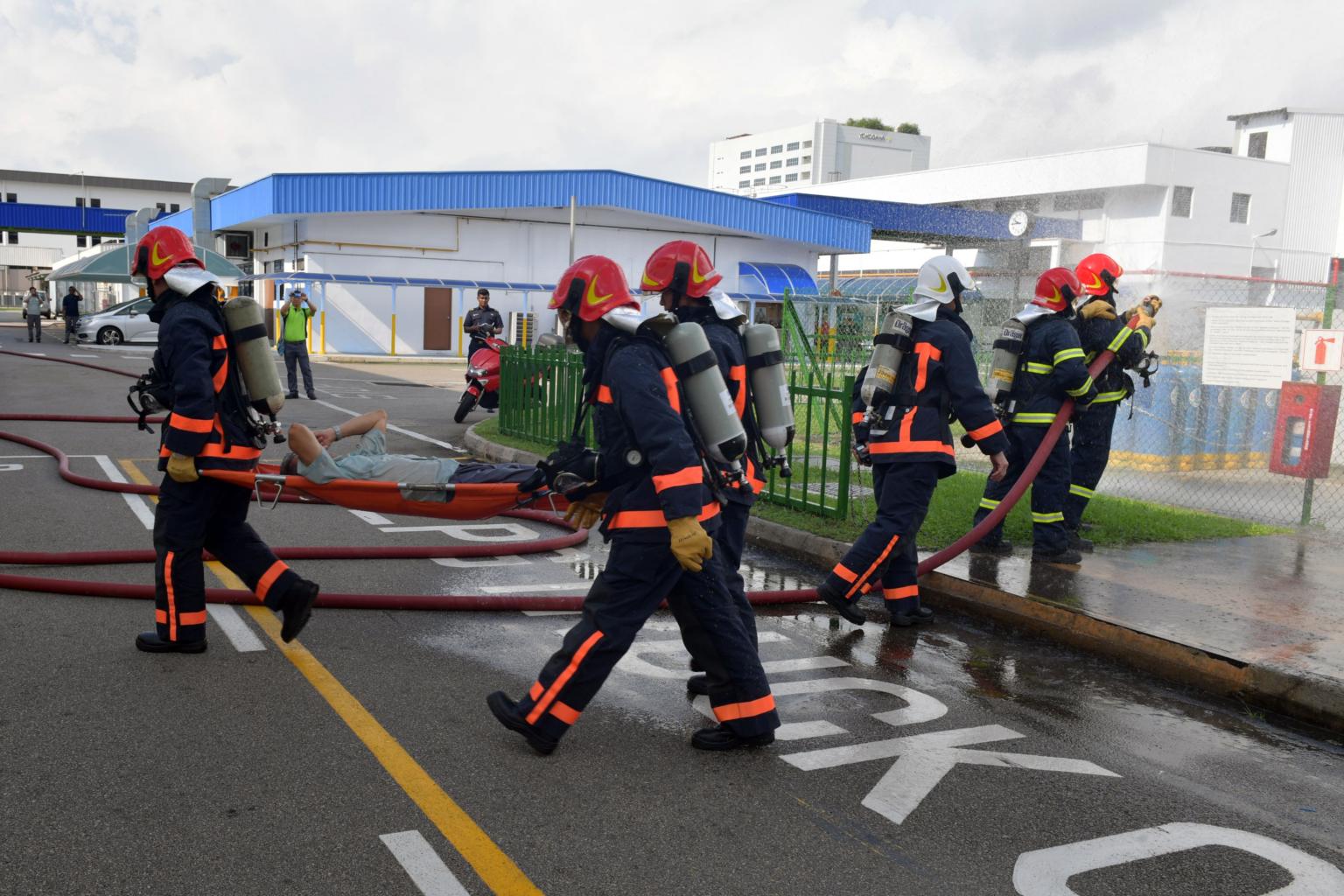Parliament: SCDF officers to get more powers and protection in rescue operations
Sign up now: Get ST's newsletters delivered to your inbox

Singapore Civil Defence Force (SCDF) officers participating in an anti-terrorism drill in Bedok South Road on May 16, 2017. Under the Civil Defence (Amendment) Bill, SCDF officers can obtain the fingerprints or other personal information of an unconscious person in a medical emergency.
ST PHOTO: DESMOND WEE
SINGAPORE - Officers from the Singapore Civil Defence Force (SCDF) have the powers to obtain the personal identification of unconscious patients, as well as use force when necessary to carry out rescue operations, under changes to the law approved by Parliament on Tuesday (Nov 20).
Under laws proposed by the Civil Defence and Other Matters Bill, officers can obtain the fingerprints or other personal information of an unconscious person in a medical emergency.
This will allow the SCDF Emergency Medical Services (EMS) to identify patients and expeditiously obtain relevant health information from the Ministry of Health (MOH) and administer appropriate and timely medical interventions, said Second Minister for Home Affairs Josephine Teo during the debate on the Bill.
Mrs Teo said that, of the 165,000 EMS patients the SCDF attended to last year, it was unable to identify about 8 per cent, or 14,000 of them. Typically these patients were unconscious or unresponsive and did not have identification documents.
Changes to the law will let SCDF officers gather more information about a patient and better respond to medical emergencies, she said.
"For instance, crew members can avoid administering drugs to which the patient has known allergies. Or, if they know that a patient with breathing difficulties has a history of asthma, they can administer the relevant drug immediately."
"They can also share the patient's identity with the hospital, so that preparations can already be made at the Emergency Department even while the patient is being conveyed there by SCDF."
To safeguard access to this personal information, the Ministry of Home Affairs will work with the MOH to grant authorised personnel access to the relevant health information strictly on a need-to-know basis, said Mrs Teo.
To prevent misuse, security safeguards and clear guidelines will be developed to determine the access rights of personnel involved and the circumstances under which the information can be accessed, said Mrs Teo. There will also be penalties imposed for any misuse.
The amendments will also give SCDF officers more powers and protection to carry out emergency and rescue operations.
Officers will now be given explicit legal powers to carry out operations which, among other things, require forceful entry into private premises, the removal of persons or objects, and the closure of roads, for the purpose of protecting lives and preventing injury and harm to human health.
Previously, SCDF officers relied on the common law to justify the use of such actions when responding to emergency and rescue operations.
The changes, among other things, will also grant officers legal protection for actions taken during operations.
Previously, officers did not have statutory protection from legal liability in operations that sometimes involved calculated risks, like cutting open vehicles to rescue trapped victims.
"This is not ideal. SCDF officers ought to be allowed to focus on the job at hand, on saving lives, without being distracted by concerns about whether they may be charged or sued for damages caused while performing their duties," said Mrs Teo.
These laws will be extended to private ambulance operators engaged by the SCDF and Singapore Armed Forces medics attached to the SCDF for EMS operations.
Given the enhanced powers and protections granted to SCDF officers, there is also a need to deter abuse by impersonators, said Mrs Teo.
As such, the changes will make it an offence for anyone to impersonate or misrepresent himself as an SCDF officer, and this carries a maximum penalty of a $2,500 fine and six months' jail.
The unauthorised production and distribution of SCDF uniforms or insignia will also be criminalised, and offenders can be fined up to $10,000 and jailed up to three years.
The Bill will also introduce criminal provisions in the Immigration Act and the Prisons Act, for similar offences relating to the impersonation of officers from the Immigration and Checkpoints Authority and the Singapore Prison Service.
During the debate on the Bill, Mr Melvin Yong (Tanjong Pagar GRC) asked how SCDF officers would obtain patients' information and about the safeguards against unauthorised access.
Mrs Teo said that SCDF ambulance crew would be equipped with a mobile device to scan the patient's fingerprint and check it remotely against the ICA database. If there is a match, relevant information from the National Electronic Health Record system can be retrieved using the patient's NRIC or FIN number.
Mrs Teo also stressed that robust measures will be put in place against unauthorised access, hacking and abuse. "SCDF is keenly aware of the need to safeguard patients' information," she said.


